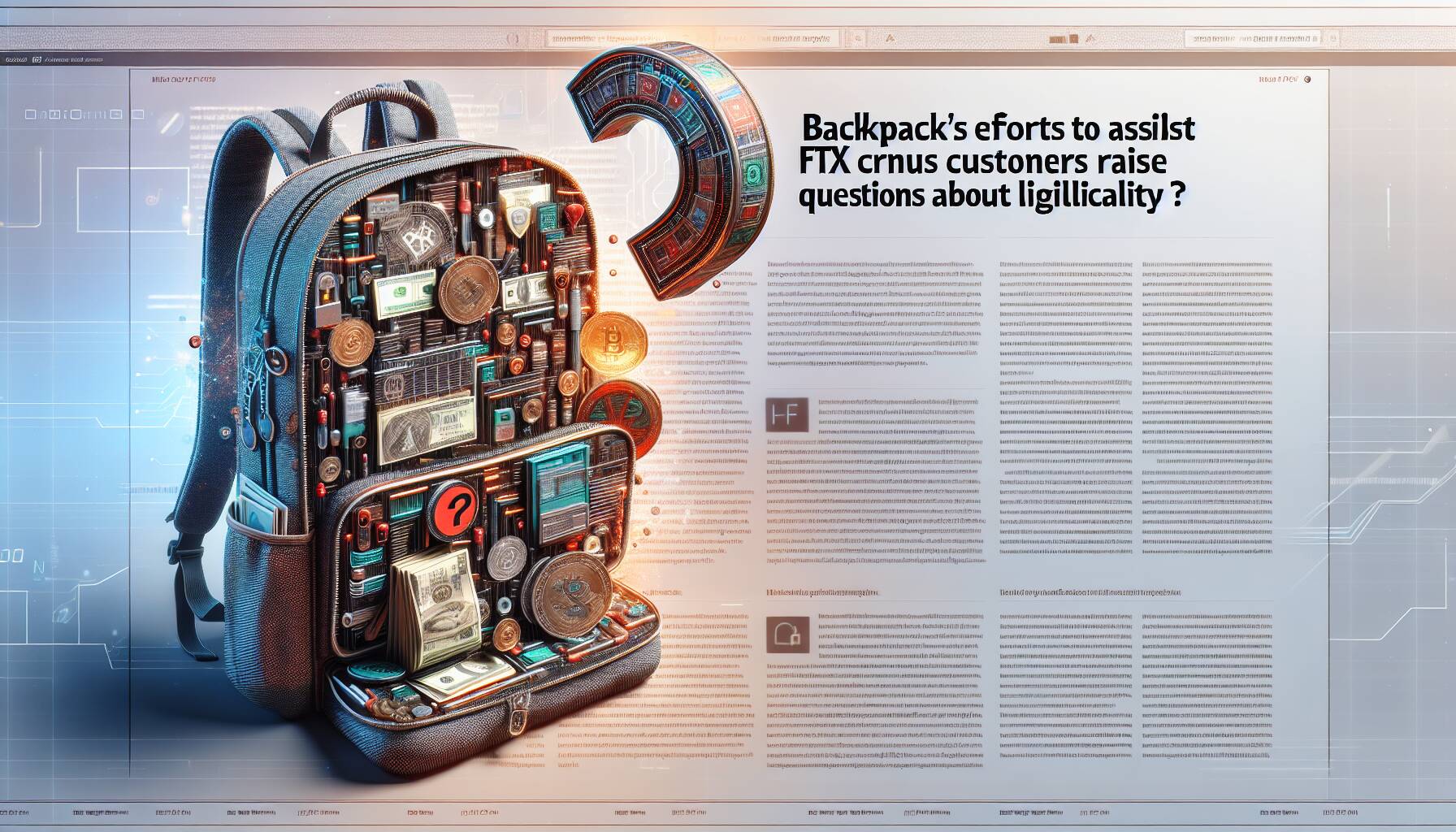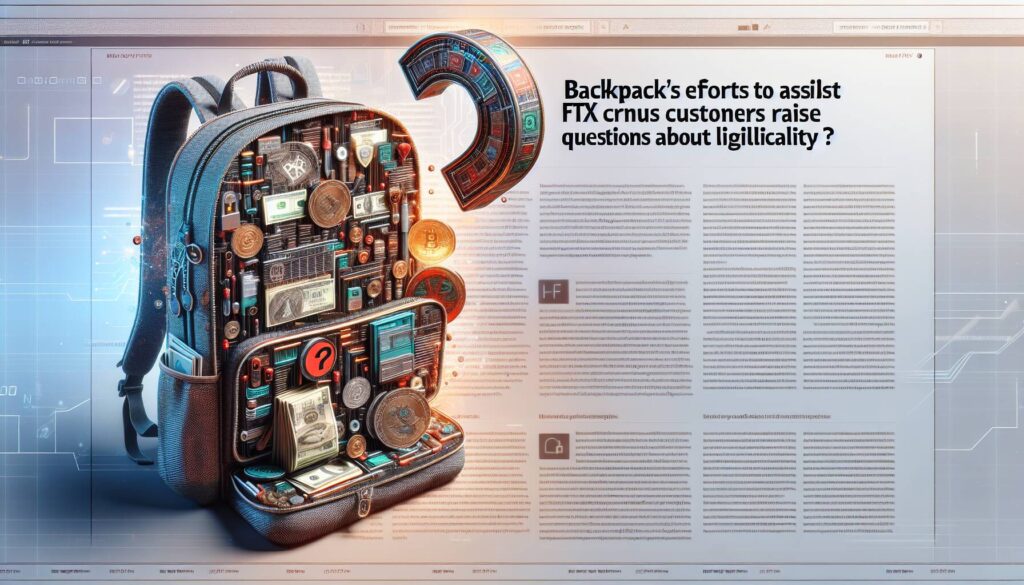In a significant development within the cryptocurrency sector, Backpack, a trading firm, is stepping up to assist former customers of the now-defunct FTX exchange. Earlier this year, Backpack made headlines by acquiring the European arm of FTX for $32.7 million, and it has now initiated the process for customers to reclaim their funds. This announcement came via a post on social media platform X, stating that customers should begin the first phase of the know-your-customer (KYC) verification process.
The KYC process is crucial as it ensures that customers are properly identified, a standard procedure aimed at preventing fraud and ensuring compliance with regulations. Following this initial step, Backpack has indicated that the next phase will involve the distribution of funds, although specifics on the timing of disbursement remain vague, with the company stating that further details will be shared at a later date.
“Coming later,” reads Backpack’s FAQ page in reference to the upcoming distribution of funds.
However, the acquisition has not been without controversy. The bankruptcy estate of FTX, the larger entity that filed for insolvency last year, criticized Backpack, asserting that it did not participate in the U.S. bankruptcy court process approved for the return of funds to affected parties. This raises questions about the legitimacy and timing of Backpack’s ability to distribute any funds to customers. It is important to note that FTX’s bankruptcy estate has accumulated a substantial total of $11.4 billion, which is earmarked for repayment to those impacted by the collapse in 2022. These payments are anticipated to begin at the end of May, presenting a complex landscape for former customers trying to navigate their options.

Key Points on Crypto Trading Firm Backpack and FTX EU
This article highlights significant developments regarding the acquisition of FTX’s European arm and the implications for customers. Here are the critical aspects to note:
- Acquisition of FTX EU:
- Backpack purchased FTX EU for $32.7 million in January.
- This move aims to support the process of returning funds to customers.
- KYC Verification Process:
- Customers are now required to complete a know-your-customer (KYC) verification.
- This verification is the first step to reclaiming their funds.
- Unclear Timeline for Fund Distribution:
- Step two of the fund distribution process is still uncertain.
- Details on when customers can expect to receive their funds are vague, marked as “coming later.”
- Bankruptcy Criticism:
- The bankruptcy estate of FTX criticized Backpack’s acquisition.
- Critics allege Backpack had no role in the U.S. bankruptcy court’s approved process to return funds.
- Overall Financial Context:
- FTX has accumulated $11.4 billion available for distribution to affected parties.
- Payments are set to commence at the end of May, which may intersect with Backpack’s fund distribution efforts.
Impact on Readers: For individuals connected to FTX or those involved in cryptocurrency trading, the developments surrounding Backpack and the potential recovery of funds may significantly affect their financial situations and trust in the crypto market.
Backpack’s Bold Move in the Crypto Landscape: A Double-Edged Sword
The recent acquisition of the European arm of FTX by crypto trading firm Backpack has stirred significant chatter in the crypto community, as users eagerly anticipate the recovery of their funds. With an investment of $32.7 million, Backpack aims to restore trust among FTX’s customers by initiating the first step of the know-your-customer (KYC) verification process. This move places it in direct competition with several other firms attempting to provide solutions for users affected by the collapse of FTX. However, while Backpack’s initiative represents a beacon of hope for some investors, it also raises questions about regulatory compliance and the legitimacy of their claims.
Competitive Advantages: Backpack’s proactive approach sets it apart in a tumultuous market where customer trust has eroded significantly. By laying out clear steps for customers to recover their funds, Backpack positions itself as a customer-centric entity in an industry often criticized for its opacity. Furthermore, the ability to handle KYC verification efficiently can enhance its credibility and user base. In contrast to other recovery efforts, such as those associated with FTX itself, which have faced extensive delays and legal hurdles, Backpack’s clear plan is a welcome change that could attract clients who have been left in limbo.
Competitive Disadvantages: However, the skepticism surrounding Backpack’s acquisition is palpable, especially given that the FTX bankruptcy estate has warned that Backpack lacks authorization for customer fund distributions. This places Backpack in a precarious position: while they desire to assist customers, they may face significant legal obstacles that could delay or complicate the fund recovery process. The fallout from such a situation could not only damage Backpack’s reputation but also deter potential customers who fear further losses.
This unfortunate development could be particularly problematic for customers of FTX who are desperately looking to recoup their losses; they may find themselves stuck in a new maze of red tape rather than experiencing a seamless recovery. On the flip side, the legitimacy issues surrounding Backpack may encourage other, more established firms in the crypto space to step up their game. Those looking to regain investors’ confidence and perhaps offer a more regulated framework could benefit from this situation by providing assurances that Backpack potentially lacks.
Ultimately, the consequences of Backpack’s efforts will significantly impact many stakeholders in the crypto world, creating opportunities for some while posing challenges for others.
















